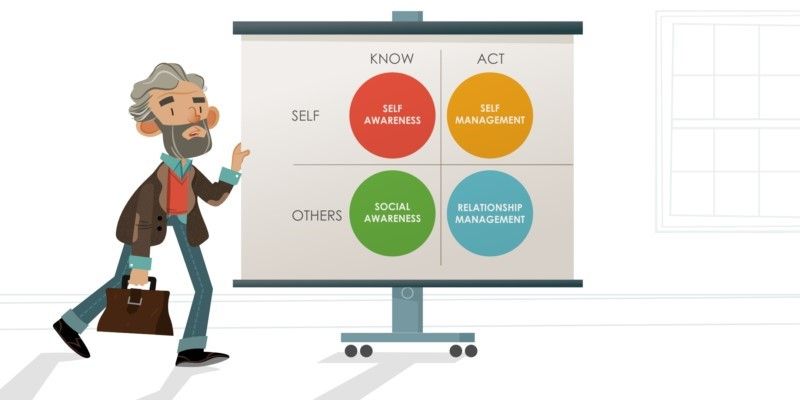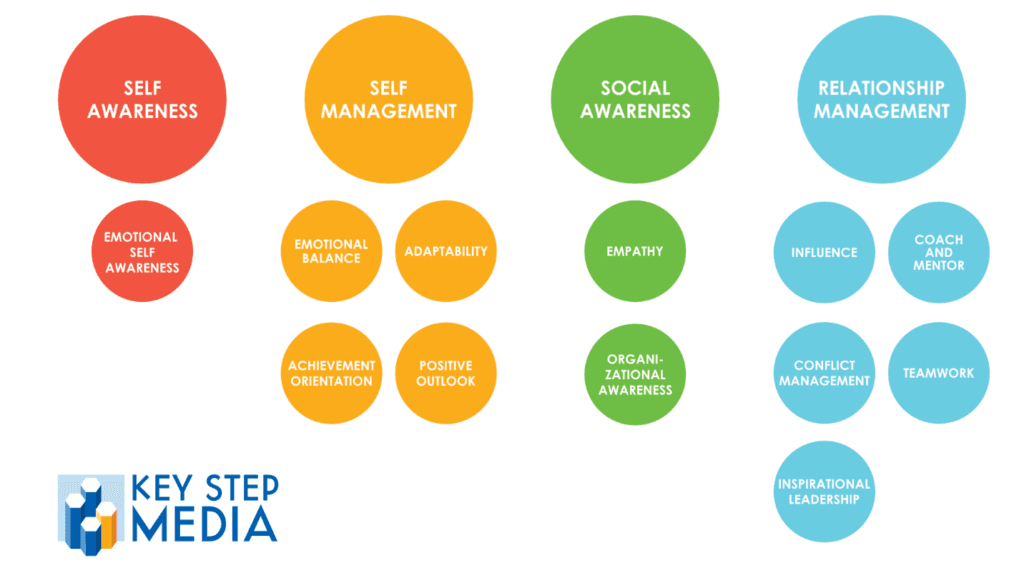

Do We Really Need Emotional Intelligence?
04 December, 2023
Share this article
“Emotional Intelligence refers to a different way of being smart. It is a key to high performance, particularly for outstanding leadership. It’s not your IQ, but rather it’s how you manage yourself and your relationships with others.” – Daniel Goleman, ”Crucial Competence: Building Emotional and Social Leadership”

Image source: Key Step Media
Over time, more models of Emotional Intelligence (EI) have helped to develop different tools for evaluating hypothetical theoretical systems (Mayer, Roberts, and Barsade – 2007) and each theoretical paradigm has conceptualized emotional intelligence from one of two perspectives: ability or mixed model.
Ability models consider Emotional Intelligence a pure form of mental ability and therefore a pure intelligence.
Mixed models of Emotional Intelligence combine mental capacity with some of the personality traits, referring to individual perceptions of one’s own emotional abilities.
In his mixed model, Daniel Goleman defined Emotional Intelligence as “the ability to recognize both our own feelings and those of others, to self-motivate, to manage emotions well in ourselves and in all our relationships” (1998).
His book, “Emotional Intelligence“, marked an astonishing revolution in psychology by analyzing the overwhelming importance of emotions in the development of the human personality.
His study of more than 25 years ago explains how the situation we are in suddenly becomes clearer when we understand our feelings, while we can discover a new way of looking at the causes of diseases which affect our family and / or society.
Relatively recently, in partnership with Key Step Media, Daniel Goleman synthesized all the significant information related to Emotional Intelligence, grouping them into four distinct areas and identifying 12 key competencies, just as you can see organized in the image below:

The four areas of EI and the key core competencies for each of them are:
- Self-awareness:
o Awareness of one’s emotions (self-knowledge, precise self-assessment, self-confidence); - Self-management (self-control, personal management):
o Self-control in order to maintain emotional balance;
o Adaptability;
o Orientation of efforts;
o Optimism; - Social awareness:
o Empathy;
o Organizational awareness; - Relationship management:
o Influence;
o Conflict management;
o Inspirational leadership;
o Coaching and mentoring;
o Teamwork.
It is important to note here that this model of Daniel Goleman can be measured on the basis of the Inventory of Emotional Skills (ECI), created in 1999 and revised as the Inventory of Emotional and Social Skills (ESCI) in 2007.
You can find out below some brief clarifications regarding the 12 key competencies of IE, offered by Daniel Goleman himself:
- “Emotional Self-Awareness is the foundation of Emotional Intelligence and is actually the ability to understand both our own emotions and their effects on our performance.” In other words, you realize how your feelings affect you and you notice how good you feel, while your value system and sense of personal purpose help you to determine the course of your actions.
- “Emotional Self-Control (also known as emotional balance) is the ability to control our disturbing emotions and impulses, to maintain our effectiveness in stressful or even hostile conditions.” When you are in emotional balance, you can recognize your disturbing emotions – such as high anxiety, intense fear, or rapid anger – and you can effortlessly find the right ways to manage your emotions and impulses. Stay calm and clear with stress, even during a crisis.
- “Positive Outlook (optimism) is the ability to see the positive in people, in situations and events.” It means persevering in pursuing goals – despite all the difficulties and obstacles – being able to see the opportunity in situations where others would only see danger that could become devastating, at least for them.
- “The Achievement competence means that we strive to meet or consistently exceed a standard of excellence.” In other words, you are always looking for ways to make things better. You set challenging goals and take calculated risks. When your goals are positive, this skill is very useful to you. But if you try to lead other people at the same pace, you can become a toxic leader. Even if the impulse to achieve helps you to reach your career goals, it can make you unhappy in your personal life.
- “The Adaptability competence is flexibility and handling change and juggling multiple demands, adapting to new situations with new ideas or innovative approaches.” It means you can stay focused on your goals, but easily adjust how you get there. You can meet new challenges while being agile in adjusting to sudden change. You’re comfortable with the uncertainty that leadership can bring.
- “The Empathy competence means you have the ability to sense others feelings and how they see things.” You take an active interest in their concerns. You pick up cues to what’s being felt in thought, with empathy, you sense unspoken emotions. You listen attentively, to understand the other person’s point of view, the terms in which they’re thinking about what’s going on. Empathic leaders are able to get along well with people of very different backgrounds and cultures, and to express their ideas in ways the other person will understand.
- “Organizational Awareness means the ability to read a group’s emotional currents and power relationships, identify influencers, networks, and the dynamics that matter in making decisions.” Someone who can recognize networking opportunities and read key power relationships will do a better job at leading. Such leaders not only understand the forces at work in an organization, but also the guiding values and unspoken rules that operate among people. Developing this competency requires Self-Awareness, Emotional Balance and Empathy. It helps us with Adaptability, Influence and Achievement Orientation, giving us tools to think strategically, navigate complexity, and mobilize others towards an outcome.
When you are strong in this competency, you are able to:
- Identify the values and culture of your organization or team;
- Acknowledge the spoken and unspoken rules at play;
- Name the processes, structures, individuals, and networks that get things done;
- Navigate the system in order to make progress on your individual and collective goals.
8. “The Influence as a competence refers to the ability to have a positive impact on others, to persuade or convince them to gain their support.” If you’re strong in the influence competence, you’re persuasive, engaging and you can build privileged relationships with key people. As you remember, leadership is the art of getting work done well through other people. And influence is the most powerful way to do that.
9. “The Coach and Mentor competence is the ability to foster the long term learning or development of others.” By giving feedback and support. You have a genuine interest in helping them develop further strengths. You give timely, constructive feedback, you understand the person’s goals, and you try to find challenges for them.
10. “The Inspirational Leadership competence is the ability to guide people to get the job done to bring up their best.” With inspiration, you can articulate a shared mission in a way that motivates and offers a sense of common purpose. Beyond people’s day to day tasks.
11. “The Teamwork competence is the ability to work with others towards a shared goal, participating actively, sharing responsibility and rewards and contributing to the capability of the team.” You empathize and create an atmosphere of respect, helpfulness and cooperation, you can draw others into active commitment to the team’s effort. Leaders skilled at this competence build positive relationships and the pride of team membership, in terms of identity.
12. “The Conflict management competency means the ability to help others through emotional or tense situations, to tactfully bring disagreements into the open and to define solutions that everyone can endorse.” Leaders who take time to understand the different perspectives work towards finding a common ground on which everyone can agree. They acknowledge the views of all sides, while redirecting energy towards a shared ideal, or an agreeable resolution.
So, if I were to answer myself to the question from the title of this article, my answer would definitely be: “YES!”. What would be yours?
Bibliography
- ”Emotional Intelligence”, Author: Daniel Goleman
- ”Models of Emotional Intelligence in Research and Education”, Author: Nicolae Sfetcu
- ”Organizational Awareness: Systems Thinking With Emotional Intelligence”, Author: Elizabeth Solomon
- ”Emotional Intelligence in Leadership: Conversations on Crucial Competence with Daniel Goleman”
Keep up to date with our most recent articles, events and all that Pluria has to offer you.
By subscribing to the newsletter you agree with the privacy policy.

“The labour market is at a point where, more than ever, the mental health of employees is at the forefront, and employers are open to addressing solutions to make labour more flexibl[...]
04 December, 2023

To stay in touch with the world and involve actively in the life of the communities and organisations we are part of, informational exchange and how information flows in our own bubbles are vital.&nb[...]
04 December, 2023

Attention is the psychic phenomenon of selective orientation and of psycho-nervous concentration in order to optimally carry out any activity.
In psychic processes, attention does not have a specific i[...]
04 December, 2023